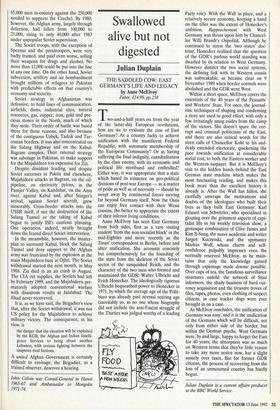Swallowed alive but not digested
Julian Duplain
THE SADDLED COW: EAST GERMANY'S LIFE AND LEGACY by Anne McElvoy Faber, £14.99, pp.258 Two-and-a-half years on from the year of the latter-day European revolutions, how are we to evaluate the case of East Germany? As a country lucky to achieve unification with the munificent Federal Republic, with automatic membership of the European Community? Or as having suffering the final indignity, cannibalisation by the class enemy, with its economic and political life moribund and enthralled? Either way, it was appropriate that a state which based its existence on geo-political divisions of post-war Europe — as a matter of pride as well as of necessity — should be swept away by continental forces moving far beyond Germany itself. Now the Ossis can enjoy free contact with their Wessi cousins, the better to appreciate the extent of their inferior living conditions.
Anne McElvoy has seen East Germany from both sides, first as a rare visiting student 'from the non-socialist block' in the mid-Eighties and more recently as the Times' correspondent in Berlin, before and after unification. She accounts concisely but comprehensively for the founding of the state from the skeleton of the Soviet sector of the vanquished Reich, and the character of the two men who formed and maintained the GDR: Walter Ulbricht and Erich Honecker. The ideologically rigorous Ulbricht bequeathed power to Honecker in 1971, by which the average age of the Polit- buro was already past normal retiring age (inevitably so, as no one whose biography did not include the anti-Fascist struggle of the Thirties was judged worthy of a leading Party role). With the Wall in place, and a relatively secure economy, keeping a hand on the tiller was the extent of Honecker's ambition. Rapprochement with West Germany was thrust upon him by Chancel- lor Willi Brandt's Ostpolitik. Although he continued to stress the 'two states' doc- trine, Honecker realised that the question of the GDR's parlous world standing was dwarfed by its relation to West Germany. However distinct the two social systems, the defining link with its Western cousin was unbreakable, as became clear on 9 November 1989 when border controls were abolished and the GDR went West.
Within a short space, McElvoy covers the essentials of the 40 years of the Peasants' and Workers' State. For once, the journal- istic techniques of shaping and condensing a story are used to good effect, with only a few irritatingly smug asides from the camp of the victors. She doesn't spare the cor- rupt and criminal politicians of the East, and there are also critical words for the siren calls of Chancellor Kohl to his sud- denly extended electorate, quickening the pace towards unification at considerable social cost, to both the Eastern worker and the Western taxpayer. But it is McElvoy's visit to the hidden hands behind the East German state machine which makes the most fascinating reading, and makes this book more than the excellent history it already is. After the Wall has fallen, she carefully unwraps the motivations and doubts of the ideologues who built their lives as they built East Germany: Karl Eduard von Schnitzler, who specialised in gloating over the grimmest aspects of capi- talist life in his weekly television show, a grotesque combination of Clive James and Kim II-Sung, the suave academic and writer Jurgen Kuczynski, and the spymaster Markus Wolf, whose charm and self- confidence palpably impresses even the normally reserved McElvoy, as he main- tains that only the knowledge gained through espionage made detente possible. Over cups of tea, the fastidious surveillance structures unfold: the network of Stasi informers, the shady business of hard cur- rency acquisition and the treasure troves of files, tapes, photos, even clothing of suspect citizens, in case tracker dogs were ever brought in on a case.
As McElvoy concludes, the unification of Germany was easy, and it is the unification of the Germans which will be difficult, not only from either side of the border, but within the German psyche. West Germans were, by and large, happy to forget the East for 40 years; the absorption was so much on Western terms that they've little reason to take any more notice now, bar a slight anxiety over taxes. But for former GDR citizens, the process of recovering from the loss of an unmourned country has hardly begun.
Julian Duplain is a current affairs producer at the BBC World Service.


















































 Previous page
Previous page